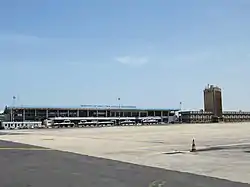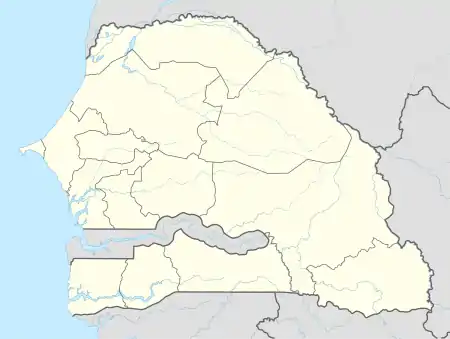Léopold Sédar Senghor International Airport Aéroport international Léopold-Sédar-Senghor | |||||||||||||||
|---|---|---|---|---|---|---|---|---|---|---|---|---|---|---|---|
 | |||||||||||||||
| Summary | |||||||||||||||
| Airport type | Public / Military | ||||||||||||||
| Serves | Dakar | ||||||||||||||
| Location | Yoff, Senegal | ||||||||||||||
| Elevation AMSL | 85 ft / 26 m | ||||||||||||||
| Coordinates | 14°44′22″N 017°29′24″W / 14.73944°N 17.49000°W | ||||||||||||||
| Website | aeroport-dakar | ||||||||||||||
| Map | |||||||||||||||
 DKR Location of airport in Senegal | |||||||||||||||
| Runways | |||||||||||||||
| |||||||||||||||
| Statistics (2013) | |||||||||||||||
| |||||||||||||||
Léopold Sédar Senghor International Airport (French: Aéroport international Léopold-Sédar-Senghor,[1] IATA: DKR, ICAO: GOOY) is an international freight and former passenger airport serving Dakar, the capital of Senegal. The airport is situated near the town of Yoff, a northern suburb of Dakar. It was known as Dakar-Yoff International Airport (French: Aéroport international de Dakar-Yoff) until 9 October 1996,[1] when it was renamed in honor of Léopold Sédar Senghor, the first president of Senegal.
History
During World War II, Dakar Airport was a key link in the United States Army Air Forces Air Transport Command Natal-Dakar air route, which provided a transoceanic link between Brazil and French West Africa after 1942. Massive amounts of cargo were stored at Dakar, which were then transported along the North African Cairo-Dakar transport route for cargo, transiting aircraft and personnel. From Dakar, flights were made to Dakhla Airport, near Villa Cisneros in what was then Spanish Sahara, or to Atar Airport, depending on the load on the air route. In addition to being the western terminus of the North African route, Dakar was the northern terminus for the South African route, which transported personnel to Pretoria, South Africa, with numerous stopovers at Robertsfield (now Roberts International Airport), Liberia, the Belgian Congo and Northern Rhodesia.[4]
Before the introduction of long-range jets in the mid-1970s, it was an important stopover point for the routes between Europe and South America, along with the Canary Islands.
From 21 January 1976 to 31 March 1982, Air France Concordes used the airport as a refueling stop between Paris and Rio de Janeiro on Wednesdays and Sundays.[5][6][7]
The airport was a Space Shuttle landing site until 1987, when it was determined that a dip in the runway could damage the shuttle upon landing.[8]
It was one of the five main hubs of the now defunct multi-national airline Air Afrique.
The airport has often been used as a stopover on flights between North America and Southern Africa. Delta Air Lines started service on 4 December 2006 between Atlanta and Johannesburg, with an intermediate stop in Dakar. This stopover has since been removed, with Dakar now served nonstop by Delta from New York–JFK. South African Airways used Dakar as a stopover with both its flights from Johannesburg to Washington and New York. The stopover for the New York–JFK flight was later removed, while the Johannesburg to Washington–Dulles flight now operates via Accra.
Senegal Airlines had a hub operation and their headquarters at the airport before the company's demise in April, 2016.[9][10][11]
Construction of a replacement airport, Blaise Diagne International, 45 kilometres (28 mi) inland from Léopold Sédar Senghor, began in 2007. Saudi Binladin Group constructed the new airport, named after the first black African elected to France's parliament in 1914, Blaise Diagne. It was initially expected to take 30 months to build and is designed for an initial capacity of 3 million passengers a year – almost double the 1.7 million annual traffic handled by the existing airport.[12] Blaise Diagne was delayed several times and finally opened on 7 December 2017.[13] As of March 2020 Senghor Airport serves only charter flights and scheduled cargo services, but not regular passenger flights.
Other facilities
The head office of Agence Nationale de l'Aviation Civile du Sénégal is also on the airport property.[14]
At one time Air Sénégal International had its head office on the grounds of the airport.[15]
The airport is also home to the French Air Force's Dakar-Ouakam Air Base (Base aérienne Dakar-Ouakam; also known as Air Base 160, Base aérienne 160 Dakar-Ouakam). The Dakar-Ouakam Air Base formed the military section of the airport. The airport can handle wide body jets, including in the past the Airbus A340-600 from South African Airways, and the Boeing 777-200 from Air France. In 2015, the airport served about 1,986,000 passengers.
Airlines and destinations
Passenger
Since the opening of its successor in 2017, there are no longer any scheduled commercial passenger flights at the airport.
Cargo
| Airlines | Destinations |
|---|---|
| Emirates SkyCargo[16] | Campinas–Viracopos, Dubai–Al Maktoum |
| Lufthansa Cargo[17] | Buenos Aires–Ezeiza, Campinas–Viracopos, Frankfurt, Montevideo |
| Med Airlines[18] | Casablanca |
Statistics
| Year | Total passengers | Change | Cargo (in tonnes) | Change |
|---|---|---|---|---|
| 2001[19] | 1,279,028 | N/A | 23,387 | N/A |
| 2002[19] | 1,358,538 | +6.2% | 16,953 | -38.0% |
| 2003[19] | 1,482,726 | +9.1% | 17,051 | +0.6% |
| 2004[19] | 1,566,573 | +5.7% | 21,159 | +24.1% |
| 2005[19] | 1,605,010 | +2.5% | 24,795 | +17.2% |
| 2006[20] | 1,676,881 | +4.5% | 22,032 | -12.5% |
| 2007[21] | 1,821,956 | +8.7% | 24,771 | +12.4% |
| 2008[22] | 1,802,559 | -1.1% | 21,789 | -13.7% |
| 2009[22] | 1,554,546 | -13.8% | 21,572 | -1.0% |
| 2010[23] | 1,687,006 | +8.5% | 24,112 | +11.8% |
Incidents
- On 29 August 1960, Air France Flight 343 crashed while attempting to land at Dakar-Yoff Airport during the precursor to what became Hurricane Donna. All 63 passengers and crew on board were killed.[24]
References
![]() This article incorporates public domain material from the Air Force Historical Research Agency
This article incorporates public domain material from the Air Force Historical Research Agency
- 1 2 3 (in French) Aéroport international Léopold-Sédar-Senghor Archived 16 February 2008 at the Wayback Machine, official website
- ↑ Airport information for GOOY[usurped] from DAFIF (effective October 2006)
- ↑ Airport information for DKR at Great Circle Mapper. Source: DAFIF (effective October 2006).
- ↑ "Map of worldwide routes of Air Transport Command, September 1945". Retrieved 6 June 2015.
- ↑ "CONCORDE SST : TIMELINE -70's". 11 May 2023. Archived from the original on 11 May 2023. Retrieved 11 May 2023.
- ↑ "CONCORDE SST : TIMELINE -80's". 11 May 2023. Archived from the original on 11 May 2023. Retrieved 11 May 2023.
- ↑ "Air France". Archived from the original on 11 May 2023. Retrieved 11 May 2023.
- ↑ "Space Shuttle Transoceanic Abort Landing (TAL) Sites: Banjul, Gambia". John F. Kennedy Space Center. Archived from the original on 10 June 2011. Retrieved 20 February 2011.
- ↑ "Dakar shuts down Senegal Airlines; new carrier to emerge". ch-aviation. Retrieved 15 April 2016.
- ↑ Cisse, Malick. "Africa's airline graveyard piles up: Senegal shuts down national carrier amid $110 million debt". Mail & Guardian Africa. Archived from the original on 16 April 2016. Retrieved 15 April 2016.
- ↑ Mentions Légales Archived 13 January 2011 at the Wayback Machine. Sénégal Airlines. Retrieved on 27 January 2011.
- ↑ Independent Newspapers Online. "Wade lays foundation for new airport". Independent Online. Retrieved 6 June 2015.
- ↑ Carley Petesch. "Senegal opens new international airport with economic hopes". AP. Archived from the original on 8 December 2017. Retrieved 7 December 2017.
- ↑ "Accueil Archived 7 August 2011 at the Wayback Machine." Agence Nationale de l'Aviation Civile du Sénégal. Retrieved on 27 January 2011. "BP : 8184 AEROPORT LEOPOLD SEDAR SENGHOR DAKAR-YOFF"
- ↑ "Directory: World Airlines." Flight International. 12–18 March 2002. 63.
- ↑ "Emirates SkyCargo Freighter Operations get ready for DWC move". Emirates SkyCargo. 2 April 2014.
- ↑ lufthansa-cargo.com - Routes & Schedules retrieved 9 March 2022
- ↑ med-airlines.com - Our company retrieved 9 March 2022
- 1 2 3 4 5 "Situation Economique et Sociale de la Région de Dakar (Édition 2005)" (PDF) (in French). Agence Nationale de la statistique et de la démographie. p. 140. Archived from the original (PDF) on 12 January 2011. Retrieved 20 February 2011.
- ↑ "Situation Economique et Sociale de la Région de Dakar (Édition 2006)" (PDF) (in French). Agence Nationale de la statistique et de la démographie. October 2007. pp. 219–220. Archived from the original (PDF) on 20 September 2010. Retrieved 20 February 2011.
- ↑ "Situation Economique et Sociale (Édition 2008)" (PDF) (in French). Agence Nationale de la statistique et de la démographie. November 2009. p. 148. Archived from the original (PDF) on 13 November 2010. Retrieved 20 February 2011.
- 1 2 "Rapport de la Situation Economique et Sociale (Ed. 2009)" (PDF) (in French). Agence Nationale de la statistique et de la démographie. 6 January 2011. p. 167. Archived from the original (PDF) on 27 July 2011. Retrieved 20 February 2011.
- ↑ "Situation Economique et Sociale (Édition 2010)" (PDF) (in French). Agence Nationale de la statistique et de la démographie. December 2011. p. 228. Archived from the original (PDF) on 7 September 2012. Retrieved 14 June 2012.
Les mouvements de passagers ont aussi crû de 8,5%, passant de 1 554 546 en 2009 à 1 687 006 passagers en 2010. [...] Le fret a également progressé de 21 572 tonnes en 2009 à 24 112 en 2010, soit un accroissement de 11,8%
- ↑ Harro Ranter (29 August 1960). "ASN Aircraft accident Lockheed L-1049G Super Constellation F-BHBC Dakar-Yoff Airport (DKR)". Retrieved 6 June 2015.
External links
- Air Base Profile from avions-militaires.net
- Profile in French from the French Ministry of Defense
- Dakar International Airport (unofficial website)
- Accident history for DKR at Aviation Safety Network
- Aeronautical chart and airport information for GOOY at SkyVector
- Current weather for GOOY at NOAA/NWS